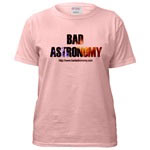
| Bad Astronomy |
|
|
|
BA Blog
|
|
Q & BA
|
|
Bulletin Board
|
| Media |
|
|
|
Bitesize Astronomy
|
|
Bad Astro Store
|
|
Mad Science
|
|
Fun Stuff
|
| Site Info |
|
|
|
Links
|
| RELATED SITES |
| - Universe Today |
| - APOD |
| - The Nine Planets |
| - Mystery Investigators |
| - Slacker Astronomy |
| - Skepticality |
Buy My Stuff

Keep Bad Astronomy close to your heart, and help make me
filthy rich. Hey, it's either this or one of those really
irritating PayPal donation buttons here.
Can a blackhole quickly slingshot you to near light speed toward a star?
Date: Sat Sep 11 22:30:35 1999Posted by Darryl
Grade level: nonaligned School: No school entered.
City: No city entered. State/Province: No state entered. Country: No country entered.
Area of science: Astronomy
ID: 937103435.As Message:
I've read about our spaceprobes using jupiter's gravitational field to increase their velocity.The sling shot effect.You could use a blackhole which had eaten it's surroundings clean and therefore wasn't emitting deadly x-rays.Would a suitably sized blackhole allow you to avoid tidal stretching.Also since you are accelerating in freefall through gravitational attraction wouldn't you avoid killing g-forces which restrict how fast a manned spaceship can accelerate and therefore speed up as quickly as you like?
I'm not sure why I'm answering your question: you already have!
Yes, you can use a black hole to slingshot a rocket. The slingshot effect we use to accelerate space probes works by approaching a planet ``from behind''; that is, it approaches the planet in the same direction the planet is moving around the Sun. By doing it this way the probe steals a little bit of that orbital energy from the planet. The amount it steals is proportional to the ratio of the masses of the probe and the planet. Probes don't mass much, while planets do, so the probe only takes a miniscule amount of energy from the planet, but it's enough to give it quite a kick. The planet, on the other hand, loses so little energy compared to the total that it is virtually undetectable.
While that's nice for planets, it's not so usable for black holes, which may not be orbiting another star (if they are, great! If not, you can't do it). However, there's another method. If you approach a massive object and fire your rockets at the right time, you can actually give yourself a very large acceleration. The amount of that kick depends on the strength of your rocket and the mass of the object. In the case of a black hole, you have a pretty good mass! You can actually use this method to tremendously accelerate a rocket, up to a small fraction of the speed of light.
You do need a largish black hole to avoid tidal stretching (I won't go into details here, if you'd like go to two web pages on my own website about this: Black Hole Sun, and Tides, the Earth, the Moon and why our days are getting longer).
The last point you make is also correct. As odd as it seems, you won't feel the huge acceleration through the black hole's gravity! You'd be in free fall. All parts of you and the rocket you are in feel the same gravity (unless there are tides) and so you all accelerate the same amount. You feel a force when the acceleration is applied to a rocket by the force of the fuel going out the back, then having the rocket accelerate you. Since the gravity works on the rocket and you at the same time, you won't feel it! And if you try the method I suggest about firing your rockets while falling in, the only acceleration you feel will be from the rocket, which you can control.
Now, if only we had a pet black hole we could try this on!
|
|
MADSCI Q&A
Q&A 1996
Q&A 1997
Q&A 1998
Q&A 1999
Q&A 2000
| Subscribe to the Bad Astronomy Newsletter! |
| Talk about Bad Astronomy on the BA Bulletin Board! |